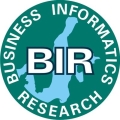Workshop on The Value of Modelling (VM2017)
in conjunction with 16th International Conference on Business Informatics Research, BIR 2017
In computer science and information systems development, modelling is an important activity which is used for different purposes, like capturing requirements, visualizing established work processes, specifying system design, expressing information structures, defining variables and their dynamics for simulation purposes, specifying interaction sequences, and many more. Despite this large spectrum of modelling purposes and use cases, the value of modelling in general and of conceptual modelling in particular still is subject of research.
Research activities so far addressed the perceived value of modelling, return on modelling, organizational change aspects of modelling and specific economic aspects of modelling. However, a comprehensive and generally accepted body of knowledge on the value of modelling so far has not been proposed. Among the reasons for this deficit are the different perspectives on “value” and the different perspectives of what is considered as part of “modelling”. Modeling could include the methods used for modeling, tools supporting modelling, models as such or the organization’s structure established for modeling.
The VM workshop aims to bring together people who have strong interest in (conceptual) modelling, the value of modelling and the organizational or stakeholder perspective of modelling. We invite researchers and practitioners from both industry and academia to submit original results of their completed or ongoing projects. We encourage a broad understanding of value and modelling, including new ideas and research in progress.
The following topics are of relevance for the workshop:
- interpretations or conceptualizations of the term “value”
- value of models
- value of modelling methods
- value of tools
- interrelations between model, method and tool value
- perceived value of models, methods and tools
- stakeholder perspectives on value of modelling
- use cases and examples for determining or measuring value
- indicator frameworks and metrics for modelling value measuring
- theories or best practices for maximizing modelling value
- relationship between quality, quantity and value
- management of value aspects in modelling
- behavioral perspectives on value of modelling
- context-dependent value of modelling
Submissions to VM 2017 have to be made by using the submission systems EasyChair. All accepted workshop papers will be published in local CEUR proceedings. A selection of best papers will be invited to submit paper extensions for a special issue of the journal on Complex Systems Informatics and Modeling Quarterly (CSIMQ). Papers submitted need to follow LNBIP formatting guidelines available from: springer.com Papers shall not have more than fifteen pages (including figures, tables and appendices). Longer papers will not be included in workshop proceedings.
Important dates:
- Paper submission: May 22, 2017
- Notification of acceptance: July 7, 2017
- Camera ready submission: July 21, 2017
- Workshop: August 28, 2017
Program committee chairs
- Martin Benkenstein, University of Rostock (Germany) (co-chair)
- Michael Fellmann, University of Rostock (Germany) (co-chair)
Program committee (preliminary)
- Peter Fettke, DFKI and Saarland University (Germany)
- Janis Grabis, Riga Technical University (Latvia)
- Marita Kirikova, Riga Technical University (Latvia)
- Agnes Koschmider, Karlsruhe Institute of Technology (Germany)
- Birger Lantow, Rostock University (Germany)
- Michael Leyer, Rostock University (Germany)
- Monika Malinova, Vienna University of Economics and Business (Austria)
- Alexander Nolte, University of Pittsburgh (USA) and Ruhr-University Bochum (Germany)
- Kurt Sandkuhl, Rostock University (Germany)
- Rainer Schmidt, Munich University (Germany)
- Ulf Seigerroth, Jönköping University (Sweden)
- Alexander Smirnov, St. Petersburg Institute Informatics & Automation (Russia)
- Janis Stirna, Stockholm University (Sweden)
- Alfred Zimmermann, Reutlingen University (Germany)

